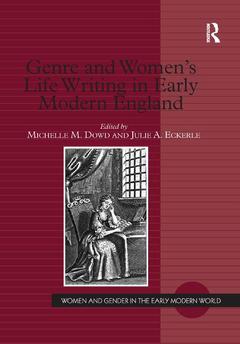Genre and Women's Life Writing in Early Modern England
Coordonnateurs : Dowd Michelle M., Eckerle Julie A.

Date de parution : 11-2016
15.2x22.9 cm
Thème de Genre and Women's Life Writing in Early Modern England :
Mots-clés :
Bolsover Castle; Catherine Field; Early Modern Englishwomen; Elspeth Graham; Elizabeth Freke; Helen Wilcox; Early Modern Women’s Life; Josephine Donovan; Early Modern Women; Julie A; Eckerle; Life Writing; Lara Dodds; Anne Halkett; Margaret J.M; Ezell; Early Modern Women’s Manuscript; Mary Ellen Lamb; Women's Life Writings; Megan Matchinske; Cavendish’s Writing; Early Modern Woman Writes; Martha Moulsworth; Margaret Cavendish; Margaret Cavendish's Writing; Early Modern Life Writings; Lady Anne Halkett; Receipt Book; Clifford’s Diary; Agnes Beaumont; Book III; Richardson’s Legacie; William Cavendish; Women’s Manuscript; Blazing World; Artist’s Model



